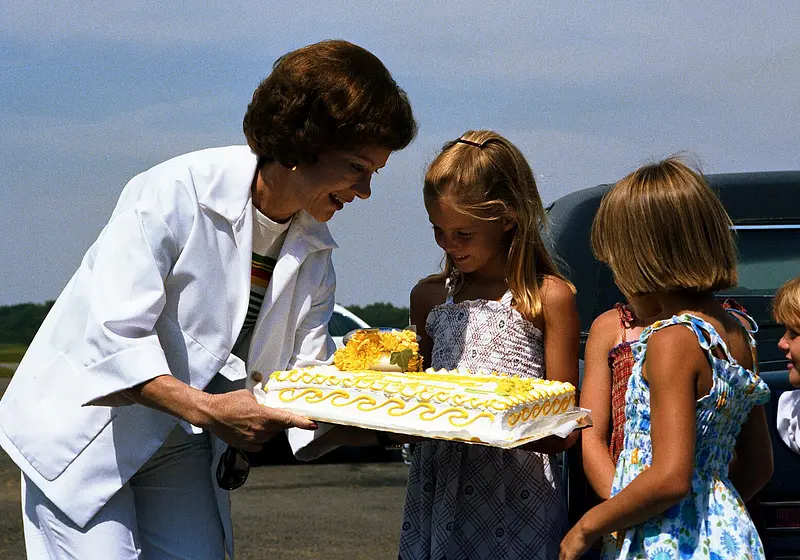On Dec. 29 the news broke that former President Jimmy Carter died at the age of 100 at his home in Plains, Georgia. Carter was a farmer, a Navy veteran, and the president from 1977 to 1981, consistently advocating for human rights and peace. After his presidency Carter continued to volunteer and remained outspoken about equality. His extensive work has redefined post-presidency, and left a legacy that'll continue to inspire future leaders.
Let us slide into your dms 🥰
Get notified of top trending articles like this one every week! (we won't spam you)President From Plains
On October 1, 1924, James Earl “ Jimmy” Carter Jr. was born in Plains, Georgia, and lived with his family on a 360-acre farm where he grew and sold peanuts since his childhood.
After graduating high school he attended Georgia Tech and enrolled in their ROTC program before being moved to the Naval Academy in 1943. In 1945 he began to date Rosalynn Smith, who he'd first met when she was born and his mother was the nurse who delivered her. In 1946 Jimmy and Rosalynn were married, and their 77-year marriage is a presidential record. A few months later he graduated from the Naval Academy in the top 10 percent of his class.
In 1952 Jimmy began working on a nuclear submarine program in the Navy, and in the same year an NRX reactor suffered a meltdown, and he and his crew were exposed to high levels of radiation as they worked to disassemble the reactor.
The following year his father died from pancreatic cancer, and Jimmy left active duty and sadly returned to Plains Georgia, while serving in the Navy Reserve. After a drought and unsuccessful farming, the family struggled financially, but Jimmy used his knowledge of science and extensively studied agriculture with Rosalynn to expand the business into prosperity.
The 1960s saw an increase in racial tensions in Plains, but Jimmy continued to advocate for racial integration at churches and school board meetings. In 1963 he ran for an open seat in the Georgia State Senate, and Rosalynn played an integral role in organizing his campaign. He served as a member from 1963-1967.
In 1966 he failed to be elected Governor of Georgia but won in 1970. From 1971-1975 Jimmy Carter was the governor of Georgia, emphasizing civil rights, and racial equality as well as boosting the education system while Rosalynn focused on promoting mental health.
Take the Quiz: What Kind of Political Personality Are You?
Ever wondered what role you’d play in the political world? Take this fun quiz to find out!
Washington Outsider

Jimmy Carter Library (NLJC) via Wikimedia
During the 1976 election, Jimmy Carter was seen as a Washington outsider, an underdog who wasn’t a part of the corruption associated with politicians. When he introduced himself he stated he was a farmer, a scientist, a Navy veteran, and most importantly, a Christian. His down-to-earth nature, simple clothes, and love for rock music made him even more endearing to voters.
After a close election, Jimmy Carter became the President of the United States, winning 50.1% of the popular vote. His informality continued to set presidential firsts. He was the first President to walk to the Capitol for his inauguration, the first President to be sworn in with his nickname, and one of the only Presidents to carry his own luggage.
During Jimmy’s presidency, he emphasized human rights, which was highlighted in the 1979 Egypt-Israel Peace Treaty after intense negotiations. The treaty outlined that Egypt would officially recognize Israel and demilitarize the Sinai Peninsula, and in return, Israel would end the use of Israeli military rule over occupied territories.
Carter’s wish to see Arab-Israeli peace would continue throughout his life, through books, speeches, and meetings. Additionally, he pardoned those who had dodged the draft during the Vietnam War, a move that boosted his popularity.
However, Carter’s presidency was tainted by the 1970s energy crisis and stagflation which caused high inflation and low economic growth. While these problems weren’t caused by him, many Americans were still dissatisfied with how he handled these issues. In July of 1979, Jimmy Carter delivered the “Crisis of Confidence” speech in which he warned that the energy crisis might get worse, but that this crisis represented a deeper moral issue.
He stressed that people must unite and have faith in the future while arguing that the government can’t solve every problem. Contemporary reviews praise the speech, but at the time it was poorly received and lowered his approval rating.
The darkest hour of Carter’s presidency came when 52 Americans were held hostage in Tehran after the United States had given asylum to Iran’s former Shah who had fled the country. Although Carter tried negotiations and a rescue mission, it wouldn’t be until 1981 (two years later) that the hostages would be released. These factors led to Reagan’s victory in the 1980 election.
Post Presidency

Jimmy Carter Library (NLJC) via Wikimedia
While Jimmy Carter’s presidency was often regarded as a failure, his work post-presidency gained him the respect of people from opposing political parties.
In 1984 he began working with Habitat for Humanity, and over his lifetime he built 4,390 homes for the underprivileged. Additionally, he founded the Carter Center which promotes human rights and disease eradication, nearly eradicating the guinea worm disease and saving millions of lives.
Throughout his life, Jimmy Carter advocated for peace and post-presidency, he visited various countries and worked with leaders like Nelson Mandela in The Elders, a group of independent global leaders working for human rights. He also criticized later presidents for their use of drone strikes or bombing on other countries. In 2006 he published Palestine: Peace Not Apartheid where he criticized military control in Palestine and outlined a peace plan.
While the book was initially controversial, Jimmy remained outspoken about his beliefs. In total, he released 32 bestseller books, ranging from his presidency and his family history to fiction and children’s books.
To many Americans, Jimmy Carter isn’t remembered for being the best president, but for perhaps being the best man to hold that title. He inspires people to have faith, serve their community, and do what they can to create a better country. Since he left office in 1980, Jimmy Carter has gone from being a somewhat controversial figure to one of the most beloved people in American politics, and his endearing legacy will only grow with time.

Jimmy Carter Library (NLJC) via Wikimedia
"“I have one life and one chance to make it count for something. I’m free to choose that something. That something—the something that I’ve chosen—is my faith. My faith demands that I do whatever I can, wherever I can, whenever I can, for as long as I can with whatever I have, to try to make a difference.”









